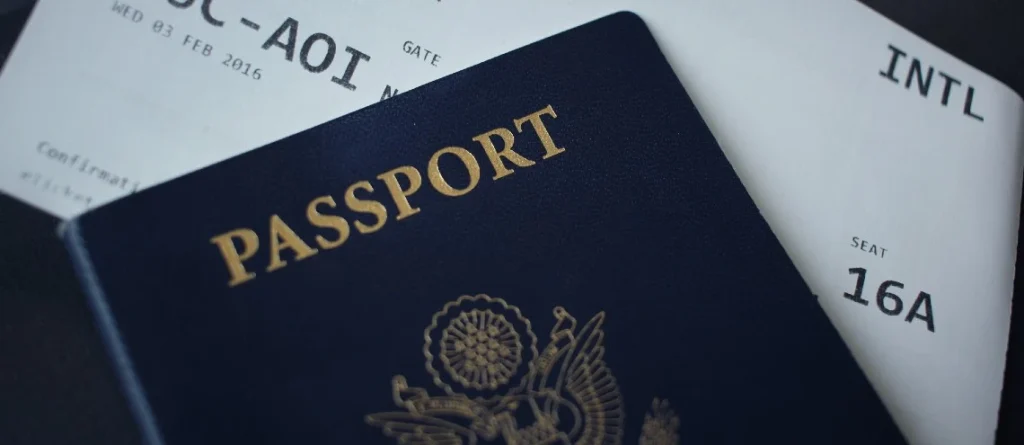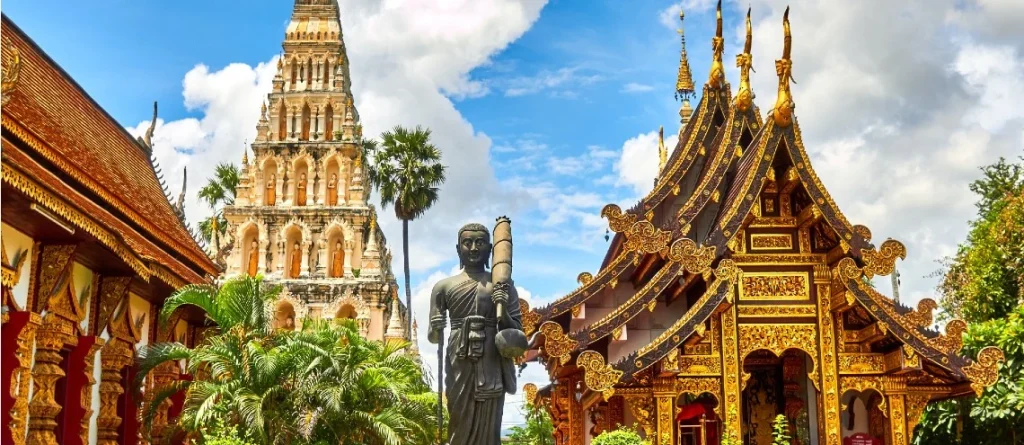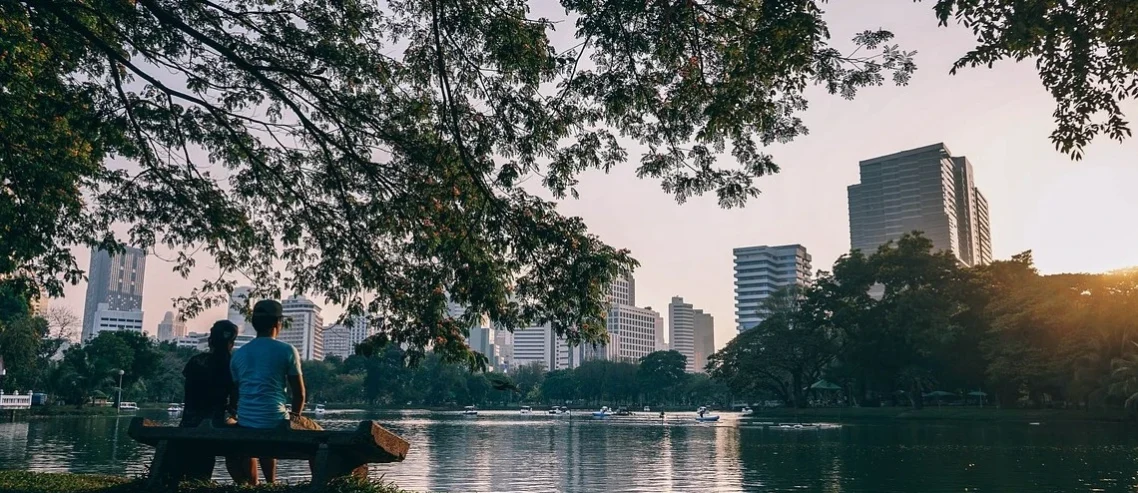The Ultimate Guide for Expats Moving to Thailand
Thailand’s natural wonders, vibrant culture, and warm hospitality attract scores of expats each year. If you’re one of these lucky souls planning a move to the country, our guide covers Thai visa requirements, the cost of living, health matters, and lifestyle essentials for a smoother transition.
Whether you’re drawn to the bustling streets of Bangkok, the stunning beaches of Phuket, or the serene mountains of Chiang Mai, the Land of Smiles has something to offer everyone. Yes, this includes working professionals, digital nomads, families, and retirees!
No matter how excited you are about moving to Thailand, the prospect of packing your bags and moving to this Southeast Asian slice of paradise can be daunting. There’s just so much to research, prepare, and wrap your head around when moving countries, isn’t there?
So, without further ado, let’s dive into the main points you need to know as an expat moving to Thailand.
Moving to Thailand as an Expat
If you’re moving to Thailand as an expat, one of the first things you need to do is figure out Thai visa requirements. Beyond visas, you should also familiarize yourself with the cost of living, health care options, and the local culture and lifestyle.
Thai Visa Requirements

Before you can even think about moving to Thailand, you’ll need to apply for a Thai visa. After all, moving to the country without a visa is illegal, and you can face serious consequences. There are different visa categories to apply for, depending on the purpose and duration of your stay.
Tourist Visa (TR)
If you plan to stay in Thailand for a short period of time, typically up to 60 days, the Thai tourist visa is a suitable option. It can be extended for an additional 30 days at a local immigration office.
Non-Immigrant Visa (ED, O, B, etc.)
If you want to study, retire, work, or conduct business in Thailand, you will need a non-immigrant visa. Each type of visa has specific requirements and restrictions, so be sure to check with the Thai immigration authorities or the Thai embassy or consulate in your home country.
Note: For those aged 50 or older, the non-immigrant O-A visa (or retirement visa) allows you to stay in Thailand long-term. You’ll need to provide proof of financial stability and meet specific health insurance requirements.
Cost of Living
Thailand offers a relatively affordable cost of living compared to many Western countries. However, expenses can vary significantly depending on your location (and lifestyle choices!). Be prepared to spend more if you have expensive taste or want to live in the heart of a big city.
Accommodation
As expected, Bangkok and popular tourist destinations tend to have higher rents compared to smaller cities. But even within a city like Bangkok, rent prices can vary between neighborhoods. A one-bedroom apartment in Bangkok can cost between THB ฿15,000 to THB ฿30,000 per month.
Factors that affect the cost of rent include:
- Size and facilities of your residence
- Distance from transport links like the BTS Skytrain and MRT underground train
- Nearby amenities like shops, malls, etc.
- And more.
Transportation
Public transport options in Bangkok include the BTS Skytrain, MRT underground train, and buses. Taxis, motorbike taxis, and ride-hailing apps are popular and relatively inexpensive. In more rural areas, driving may be your only option. Monthly transportation costs range from THB ฿1,000 to THB ฿3,000.
Food and Groceries
Thai street food is delicious, affordable, and available everywhere. You’ll be glad to know that meals cost as little as THB ฿30 (around USD $1). Dining at local restaurants or Western eateries will be pricier. Basic groceries tend to cost around THB ฿1,500 per week but can be higher if you buy imported items.
Healthcare
Healthcare in Thailand is renowned for its quality and relative affordability. With excellent medical facilities such as Bangkok Hospital, Samitivej Hospital, and Bumrungrad Hospital, and skilled healthcare professionals, you’ll be able to access both routine check-ups and specialized treatments.
Note: Although public hospitals in the country offer good medical care, many expats prefer the private sector for the latest medical technology and expertise, added amenities, and English-speaking doctors.
Health Insurance Options

To ensure access to the best healthcare in Thailand without paying out of pocket, it’s a good idea to secure a robust health insurance plan. From local plans to international ones, you have various health insurers and health insurance options to choose from.
Local Health Insurance
As the name implies, local health insurance will only cover you in Thailand. These plans tend to be more affordable than international ones. However, they aren’t practical if you travel often or plan to relocate to another country in the near future.
International Health Insurance
International health insurance provides coverage both in Thailand and around the world. The main advantage of these plans is that they are globally portable. This means you can travel or relocate as you wish, and your health coverage remains intact!
Culture and Lifestyle

And now for the fun part! Be sure to immerse yourself in the culture by learning the language, understanding local customs, and showing respect for age-old traditions. Befriending locals will enhance your expat lifestyle in Thailand.
Here are some tips to immerse yourself in the culture:
- Learn basic Thai phrases and greetings
- Get acquainted with local Thai flavors and foods
- Participate in Thai festivals like Songkran, Loy Krathong, and more
- Visit temples and historical sites
- Practice the “Wai” gesture (or pressing your palms together and bowing slightly to greet others)
- Be mindful and adhere to Thai etiquette, such as respecting elders, showing reverence to monks, dressing appropriately at temples, and more
- Travel throughout the country and explore all that Thailand has to offer
Conclusion
As you may have been able to guess, there’s a lot that goes into preparing for a move to Thailand as an expat. From finding suitable accommodation to budgeting for groceries and beyond, it’s important to do the groundwork before hopping on the plane.
When it comes to securing health insurance, you can also enlist the help of an expert and impartial brokerage like Pacific Prime Thailand. With over 20 years of experience, we’ll make sure that you find the right plan for your needs and budget.
Contact us today to get started!
Frequently Asked Questions
What areas are most popular with expats in Thailand?
Bangkok, Chiang Mai, Phuket, Koh Samui, and Hua Hin are very popular with expats in Thailand. For those heading to Bangkok, expat-friendly areas include Phrom Phong, Ekkamai, Sathorn, and Ari.
Is it a good idea to retire in Thailand?
With its affordable cost of living and excellent healthcare, Thailand has long been a magnet for expat retirees. You’ll find plenty of expat retiree communities in cities like Bangkok, Chiang Mai Hua Hin, and beyond.
How much money do I need to live comfortably in Thailand?
You’ll need anywhere between THB ฿25,000 to THB ฿100,000 to live comfortably in Thailand, which is much lower than in Western countries. Although food, rent, and utilities can be quite affordable, you’ll be spending a lot more if you’re after luxury.
What are the drawbacks of living in Thailand?
Some drawbacks of Thailand include hot and humid weather, flooding during the rainy season, traffic congestion (especially in big cities like Bangkok), and air pollution. Language barrier can also be a challenge/an issue if you don’t speak Thai.
- An Overview of Thailand’s Medical Tourism Industry - September 20, 2023
- How to Open a Bank Account in Thailand in 2023 - August 25, 2023
- Thailand Has One of the Highest Suicide Rates in the Region - August 7, 2023



Comments
Comments for this post are closed.
We'll notify you
when our team replies!